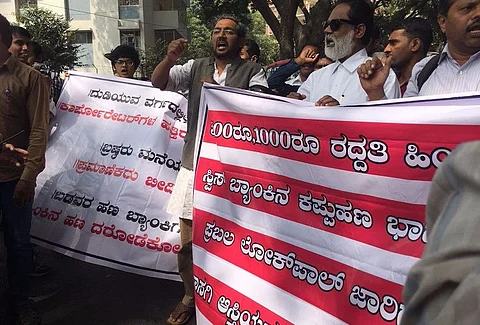

Over 40 activists, including two law students, were detained by Bengaluru police when they organised an Occupy RBI protest against demonetisation in the city on Thursday.
The occupy protest is possibly the first of its kind against the demonetisation, even as reports of hardship are pouring in from across the country.
DCP (Central) Sandeep Patil told The News Minute that about 10 people had been detained before the protest began.
After the protest, which lasted for hardly two minutes, the police detained about 30 activists who attempted to storm the RBI office on Nruptathunga Road.
Activists from various organisations including CPI(ML), Social Democratic Party of India, National Hawkers Federation, Garment and Textile Workers Union, AICCTU, Karnataka Sangolli Rayanna Yuvakara Vedike and Karnataka Tamil Makkal Iyakkam were picked up by the police outside RBI.
"Congress government attacks our freedom of speech. We condemn the Modi government's move to demonetise and the state government's move to arrest us," said Vinay Sreenivasa, member of Bengaluru District Beedhi Vyapari Sanghatana Okkoota.
"More than 40 people are dead. Workers are not paid salary. Street vendors and small stores losing business. Small scale industries losing business. Economy is at halt but Janaradhana Reddy's wedding went on well," Vinay said.
Questioning the logic of introducing Rs 2,000 notes without Rs 500 notes, the protesters demanded that the news of Rs 500 be introduced at the earliest, and deadline to submit old notes be extended.
In a media statement, they also demanded that the government publicly reveal the list of Indians who have offshore accounts in Swiss banks, Panama and other tax havens.
Another major step they wanted the government to take was to recover crores of rupees from corporates listed as non-performing assets (NPAs) in Public Sector Banks.
The government must simultaneously bring in a strong Lokpal, strengthen the CVC and ensure CBI is independent, the media statement said. Their other demands include the regulation of the funding of political parties; the closure of havens; effective monitoring of the banking sector, corporate accounting and intra-firm sales; effective implementation of ‘Money Laundering Act’ to tackle Hawala and money laundering.
The want the black money so recovered to be used to provide universal healthcare, universal education, and a minimum wage of Rs. 21,000/month to all workers and guarantee minimum income for all farmers.
On Wednesday evening, Karnataka Chief Minister Siddaramaiah instructed banks in the state to remain open on November 17, which is a government holiday on account of Kanakadasa Jayanthi. This was done to ease the pressure that has been mounting on people over demonetisation.
Siddaramaiah tweeted saying: "...The State Government has cancelled the holiday declared for Kanaka Jayanthi, under the Negotiable Instruments Act, 1881, for all scheduled and commercial banks in the State, and has asked them to work to ease pressure from the demonetisation of higher denomination currency notes and help the public."
Nine days into demonetisation, there are long queues outside banks, ATMs and post offices.
Many, including experts, have lauded Prime Minister Narendra Modi for the move, and say it will wipe out black money. Other experts however, argue that by demonetising high value currency a very tiny portion of black money is removed from the system, while the means through which such money is generation are left untouched.